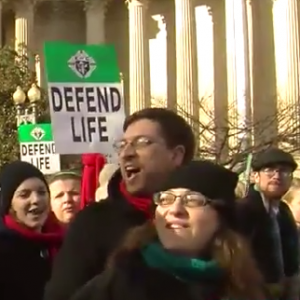 WASHINGTON — Barack Obama reaffirmed his “deep commitment” to abortion on Thursday despite the throng of thousands that gathered in the nation’s capital for the annual March for Life marking the 42nd “anniversary” of the Supreme Court ruling of Roe v. Wade.
WASHINGTON — Barack Obama reaffirmed his “deep commitment” to abortion on Thursday despite the throng of thousands that gathered in the nation’s capital for the annual March for Life marking the 42nd “anniversary” of the Supreme Court ruling of Roe v. Wade.
“Forty-two years ago today, the U.S. Supreme Court issued its ruling in Roe v. Wade, a decision that protects a woman’s freedom to make her own choices about her body and her health, and reaffirms a fundamental American value: that government should not intrude in our most private and personal family matters,” Obama wrote in an official statement.
“I am deeply committed to protecting this core constitutional right,” he continued. “The federal government should not be injecting itself into decisions best made between women, their families, and their doctors.”
As in years past, Obama also commented that he is “deeply committed to continuing our work to reduce unintended pregnancies, support maternal and child health, promote adoptions, and minimize the need for abortion.” But he stated that he ultimately wanted women to have equality with men.
“Today, as we reflect on this critical moment in our history, may we all rededicate ourselves to ensuring that our daughters have the same rights, freedoms, and opportunities as our sons,” Obama said.
In the meantime, tens of thousands of Americans took to the National Mall in Washington for the annual March for Life, an event that attracts pro-life citizens from across America. In addition to the traditional march to the Supreme Court, participants gathered to listen to speeches from a number of pro-life figures, including Rep. Chris Smith (R-NJ) and Sen. Tim Scott (R-SC). Some carried signs and some chanted slogans such as, “Roe v. Wade has got to go.”
While some pro-life Christians skipped the event due to its ecumenical nature, a small group of abortion advocates were present to counter the march, bearing signs that read “Abortion on demand and without apology.” Several were arrested, being taken away in handcuffs.
This year, some of the marchers expressed frustration with Congress after it decided to scrap the Pain Capable Unborn Child Protection Act, which would have ended abortion after 20 weeks. Some female lawmakers had expressed opposition to the measure, including those who are Republican, mainly due to its requirement that women who seek an abortion following rape report the criminal act.
But while some thought the bill was too strict, others didn’t think it went far enough as it left exceptions.
“When we say that a child can feel pain at 20 weeks and that we should not kill them, tear their arms and legs off, why would we make an exemption for anyone at 20 weeks?” Monica Kelsey, a member of the group Living Exceptions, a coalition of women who were conceived by rape, told U.S. News & World Report. “They’re negating their original argument.”
“[It was] one of the most disappointing moments of my life,” said Sen. Trent Franks (R-Ariz), the main sponsor of the bill, after learning that it would not be moving forward in Congress at this time.
As previously reported, the Supreme Court ruling of Roe v. Wade was decided on January 22, 1973, and was handed down by a Republican majority. Out of the seven justices that ruled in favor of Roe, a case that dealt with an admitted false claim of rape, five were Republicans. Judge Harry Blackmun, nominated by Richard Nixon, wrote the majority opinion.
“The Constitution does not define ‘person’ in so many words,” he wrote. “[I]n nearly all these instances [where it is cited], the use of the word is such that it has application only post-natally. None indicates, with any assurance, that it has any possible pre-natal application. … In short, the unborn have never been recognized in the law as persons in the whole sense.”
However, he noted that if it could be proven that unborn babies truly are persons, abortion could come to an end in America.
Become a Christian News Network Supporter...


